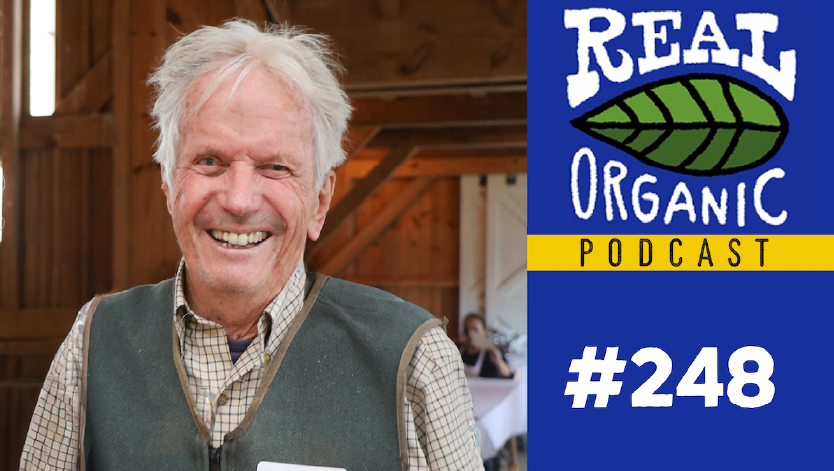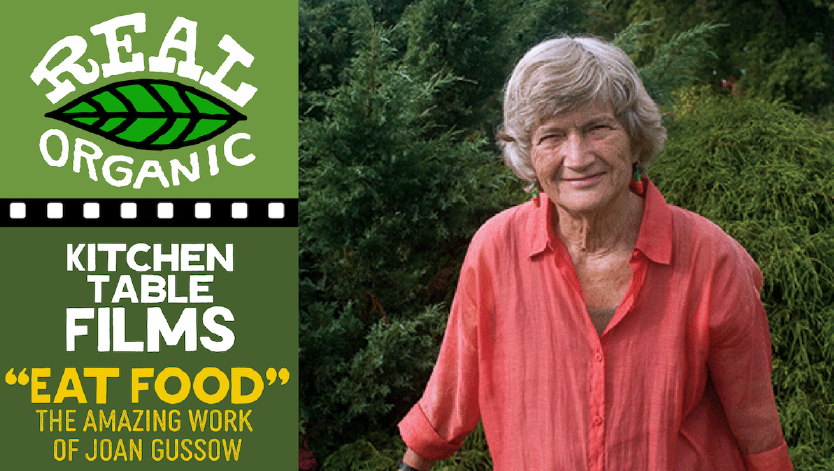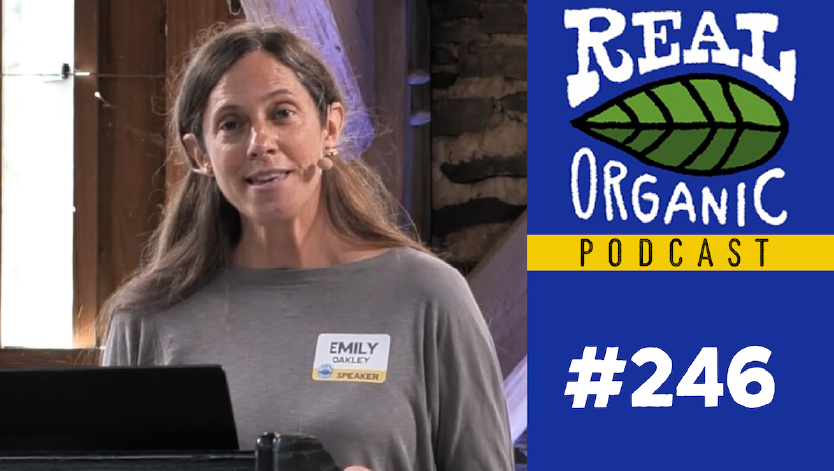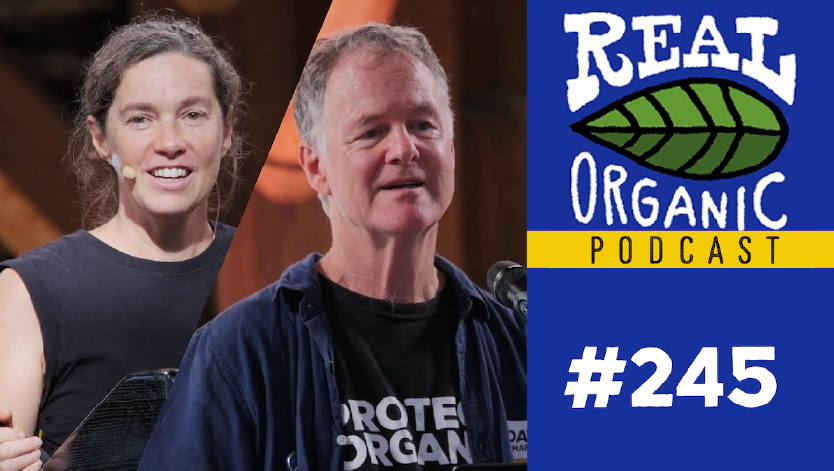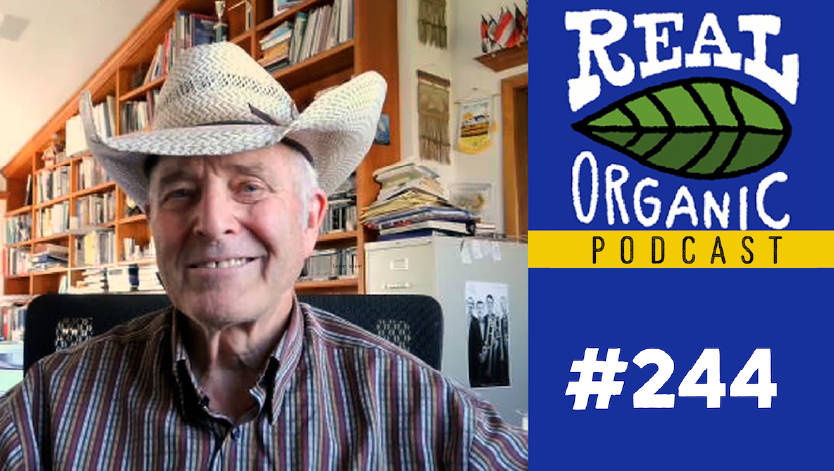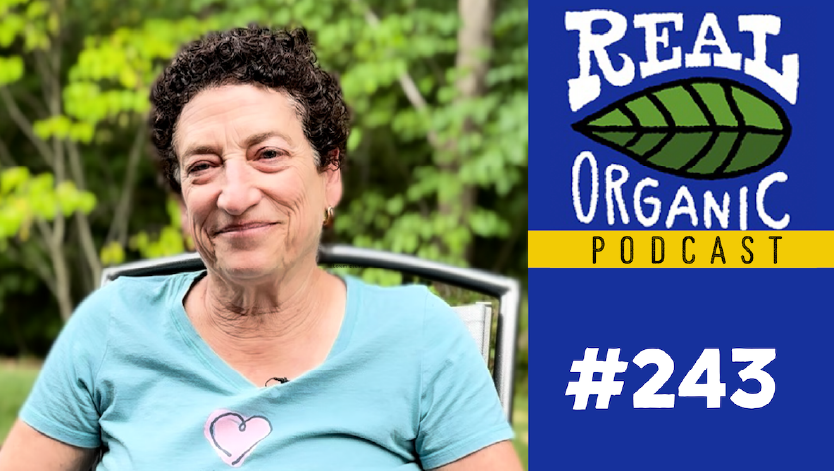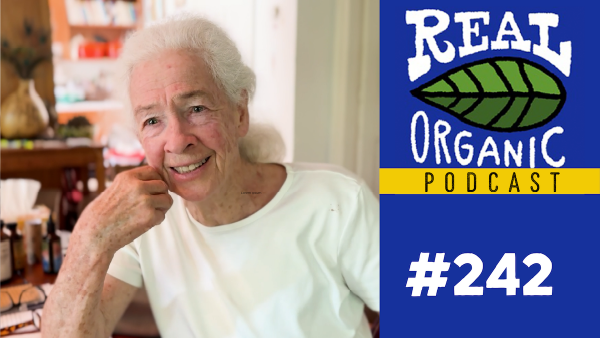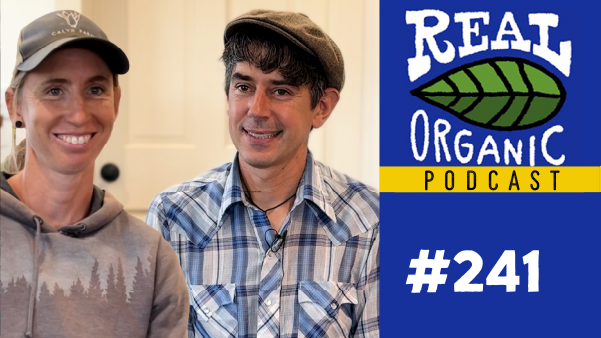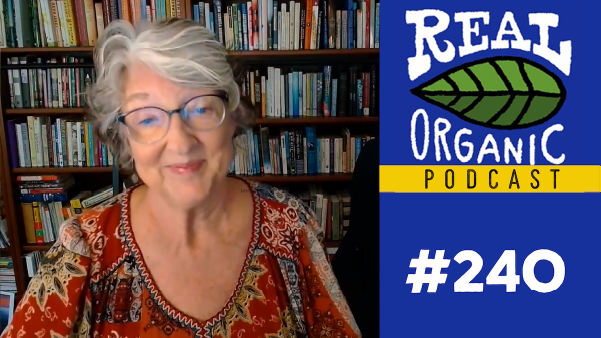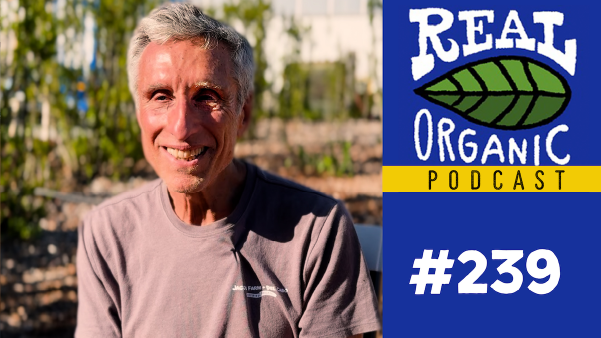Episode #199
Paul Holmbeck at Churchtown: Getting Organics On The Offensive
Welcome! You can subscribe and download episodes of our show through your favorite podcast app.
You can also subscribe to receive the video version of each episode on our YouTube channel.
Paul Holmbeck’s talk has been edited for clarity and readability.
Paul Holmbeck delivers his talk “Getting Organics On The Offensive” to the crowd gathered at Churchtown Dairy on September 28, 2024, for Real Organic: A World Movement:
Linley Dixon 0:00
All right, so in our final round of speakers, we’re going to give you a lot of hope. Our next speaker is Paul holmbeck, and he’s going to show us where organic is working. I know it feels really like what are we doing here? It’s all a mess, but there’s a reason that organic standards are in place, and it’s to support the farmers, and there’s maybe millions, but at a minimum, hundreds of 1000s of organic farmers all over the world. And Denmark is a real example of where organic is working, and we’re going to hear about it, and hope we can bring it to the
Paul Holmbeck 0:39
US. All right. Hey, my biggest challenge is going to be not to move around too much, because I’ve got the video here. But it’s great to see you all, and I really want to thank the real, organic project for inviting me to share some lessons from the global level, the European level and the level of national level Denmark in 20 minutes. So hang on to your hats. And also, I really want to appreciate the dialogs today and also yesterday. I mean, if I look back at my own organization, organic Denmark, everything good that we’ve done has come out of these engaged conversations with with our farmer members and with our allies, with processors, about what’s next, what’s working, what’s not working. And I’ve really been hearing those kind of conversations here. So it’s really powerful. So my I think it’s all about getting organics on the offensive. And what I want to share with you, because I have already heard that people don’t realize this the last three or four years. Those, those examples that Tim was talking about, about how organics and agro ecology is really delivering, on food security, on climate adaptation, on what, on water retention, on soil fertility, those are all being aggregated, and science is speaking. And through the IPCC, the international climate panel, the FAO, the World Food Security Committee, they’ve been debunking these myths that we have been beaten over the head with through the years, that organics can’t feed the world, that organics is bad for climate. We actually have science on our side. And what this led to in 2021 just a few years ago, is a whole group of nations and global actors standing together to say we’re going to upscale agroecology as a tool to combat these intertwined challenges worldwide. Ifome Organics International is one of the founding members of that. Our strategy has five elements. This is how we’re going to build on this, this momentum in the organic movement globally. One is to, of course, improve organic policies worldwide so they’re more supportive of farmers and more supportive of development. The other is to strengthen our frontline organizations, to get different hands working hands, women’s hands on the levers of change in policy and in markets and in the fields. We want to grow our organic markets, and not just certified third party, certified organic, but PGS, participatory guarantee systems, extremely powerful, low cost market access for smallholder farmers. Continuously improve organic of course, because we haven’t reached our goals, safeguard and strengthen the integrity of organics as well. And this is largely about standards, but not entirely so. Join us. Join iPhone. We also have the world organic Congress in Taiwan, please come. It’s at the beginning of December. At the European level, the Green Deal and farm to fork, the organic sector was fully mobilized to impact these policies, and we got we came out of it really well. Organic food and farming is now a central pillar of EU policy on climate, biodiversity, water quality, rural development and rural livelihoods. We have a goal of 25% organic for Europe on average, not for every country, but on average. And we have a very strong European wide organic action plan, much modeled after Danish organic action plans. We still need a lot, a lot of game changers, not least the repurposing of the billions of dollars or euros in subsidies to farmers, which are pointing farmers consistently in the wrong direction, enacting leveling the playing field in the market by enacting pesticide fees. The environmental costs are reflected in the cost of products. Denmark has done this, but not many other countries have. And for example, the European Union recommends lowering sales taxes we have. Most countries have sales taxes on food, lowering or eliminating the sales tax on organic food. If that happened in Denmark, we have a 25% sales. Act on everything, everything. If we just cut that in half, many organic products would be cheaper than conventional products. All 27 EU nations now have a goal for organic farming. The lowest is 5% the highest is 35% 5% that would be a 400% increase in the United States. But it’s all about action. It’s not just about setting goals. It’s about actions. In Germany, as one example, late last year, announced the organic strategy 2030, again, lots of inspiration from Denmark, very much driven by the government, with involvement from the sector, but kind of a government driven process. Most interesting, though, I think, was the Federal Minister of Agriculture said he sees organics as a driver and model for transition in all of agriculture. So they have a goal of 30% organic, but he sees it as the model for all of agriculture. The Netherlands, very different model here. I work together with the organic associations to develop a strategy, an action plan, a national action plan for market development, but also a new policy framework for the Netherlands. You may think they’re the Dutch, they’re super organic. They’re not they they trade organic, but they’re Mark they haven’t developed their market, and they haven’t developed their farming. So the sector came with all these recommendations. We did intensive lobby work with the ministry. They took huge portions of the sector’s own action plan for organics, built it into a National Organic action plan and financed it. And all of this happened in 12 months. This is the action plan that has significant measures for developing production, innovation and market development. But this is also there’s other areas of the world where this is also happening. A number of Indian states and Himalayan nations are united in working together in a collaboration around developing new National Organic plans for themselves. I’ve been working very intensely in East Africa, particularly with Uganda and Tanzania. Tanzania launched its national agri ecology strategy, called the National Ecological organic agriculture strategy, in November, and now we have a task force working on that, combined ministry, sector Task Force. It was celebrated with great fanfare. It was a two and a half year process, massive consultations, lots of intelligence coming from farmers about what needed to happen, what could happen, and there’s support for the activities. There’s also another side to what’s happening in Tanzania with a grass, as Tim mentioned, but that’s another story. So my lesson from a lot of this is that no nation has developed a truly thriving organic sector without a national policy framework. The United States has some really good elements. Yeah, there’s a little bit of money here for research and for market development, some training, but there’s no plan for a thriving organic sector. There could be. Denmark was the first to do an organic Action Plan 1995 we’ve done a number of them since. It’s been a model for others. And I just want to talk about how we got organics on the offensive in policy, in markets and in farm communities. If you look at the top 10 countries with the highest retail organic sales, Denmark’s number one, 12% if you look at the first three, Austria, Switzerland and Denmark, there’s some things in common. One is the organic sector. Organizations have developed a capacity to work professionally with retail and wholesalers to drive organic growth. They’re active players, and they’re not just waiting around for a market. They’re not just talking to consumers. They’re developing they’re developing organics. And there’s some degree in each of these countries of National Organic policy support for that. While we have 12% of the full market, there’s an awful lot of things called food and drink. If you look at, if you look at the a lot of the sort of common everyday products that families use quite a bit of. We have 42% of the market for fresh milk. So, you know, four out of 10 liters of milk that’s sold in supermarkets in Denmark is organic. We have 94% of the plant milk market, you know, for other like grain based products, flour, oats, some pastas, we have 30 to 50% of the market. Many some fruits and vegetables, 30 to 50, even 80% conventional bananas are being phased out in most of retail now because they don’t sell enough of them. And you know, number of other products, carrots, a big product in Denmark, 55% almost completely Danish. How about these folks? How’s it going for them? These are, these are people that I’ve This is why I worked for 25 years with organic Denmark, and things are going pretty good. I mean, there’s a lot of the same challenges that you’re talking about here. In terms of being farmers, but we’ve doubled the organic area, 2007 to 20. A new goal is to double again in 2030 it’s a fairly large percentage of significant production. So milk is at 13%
Paul Holmbeck 10:13
but you know, eggs, 25% of all production. You know, free land, vegetables, 30% organic farmers earn more eight of the last 10 years compared to conventional farmers. There’s interest from young farmers, and that’s a whole story in itself. But when we started working with young farmers, with the agricultural schools, getting them out on organic farms, then getting a, you know, a week of teaching, then getting a curriculum, and all those kinds of things, they were really negative. They’re super negative. The young farmers, they thought, we want modern farming, you know, but now there’s really an openness to it. Organics is seen as driving innovation. That’s power. That’s powerful, you know, we’ve talked about, you know, this is this whole thing. Technology is going to save the world. Who’s developing a lot of the new technologies, organic farmers and competitiveness, the idea that you can’t you can’t live completely by selling food to people who don’t care about food and won’t pay for it, and then collaboration and respect and positive signals from the conventional or What are we calling them now, general farm organizations. And this is a quote from them. Organic Farming is Danish agriculture, strongest sustainability and value added concept. I hate that word, concept but, but you see the signal that it sends. There’s other signals about, you know, from the chairman, who said, one point, you know, organics is inspiring all of agriculture, it’s so powerful to say that to farmers. It makes young farmers want to be an organic farmer. It makes politicians listen more, and none of this happened on its own. For me, the three key drivers for organic success, it’s strong policy, it’s collective market initiatives, and its organic sector capacity, and then a lot of coordination, collaboration across those lines. For me, the most catalytic and most often missing element is organic sector capacity, because where does policy come from? That also comes from there. Where do collective market initiatives come from they also come from there. So first message, unite. That’s one lesson, and build capacity to drive change. We merged eight organizations into one that gave us a little more capacity than got policy to support development of our organization, so we had resources to fight the fights in retail, among wholesalers and in policy that we needed to do, and then be a driver, you know, inspire help them, help farmers also and food companies on their journey, and give policy makers a lot better advice. Strong policy is built on the why of organics. And we have such a story to tell. We deliver on all the SDGs, essentially, but the big ones, you know, when we talk to politicians, and we have 12 political parties in our in our parliament, 11 of them support organics for one reason or another. You know, for some it’s animal welfare. For others, it’s the green agenda. For others, it’s just a new economic pathway for farmers and an export, a growth area, or something like that. So because it’s part of the solution to these SDGs, we’ve succeeded often in building organics in as a tool in these broader policy areas for rural development, for water quality, for getting pesticides out of food. And in this case, this is one case, climate 2021 we developed a new national climate strategy for agriculture, the goal of doubling again. Organics is in that plan. It’s codified there and supported by all the political parties that stand behind it. We also, at the same time, got made Europe’s largest single investment in development of plant based foods. And because it matters, because organics has position, and because it matters how those plants and plant based foods are grown, we’ve got 50% of this giant fund. It’s like a billion kroner going to organic plant based foods specifically so that kind of building in embedding, and then there was a lot of support to our work further developing organic practices in our innovation center and other things. So our my approach to lobby work has always been, you know, ask not what your country can do for organics, but what organics can do for your country. We’re coming to solve problems. We bring solutions, and organics is a very effective tool. And over time, we’ve proven that none of the other policies for pesticide reduction have truly worked in Denmark only recently, when they finally set the pace. Pesticide fees up to astronomic levels for the for the worst, pesticides that started to help. We also don’t make politicians choose sides. If we made them choose sides between conventional and organic production, we would lose because they’re still bigger and they’re still more powerful. It’s the most powerful lobby in Denmark. But we don’t need them to choose sides in order to build organics. Develop organics in so many ways, and then we use tremendous energy on building alliances, not least with the general farm organizations, lots of cups of coffee between our farmers and their farmers, getting them out on farms, showing how organics delivers, doing joint projects with them, and also trying to get them to see the obvious point, that if they accept, I mean, I remember the moment we were in negotiations, and the conventional farm organization realized that if they accepted the science that organics delivers on reducing nitrogen leaching, that we helped them solve that goal that they were it was impossible they were going to reach the national goal required by the European Union. So, you know, there’s some pragmatism in it, but it’s about relationships and working with it. Another key lesson is balance in policies. We made one big mistake in 1997 and I will never forget it, because it was bloody. We set the conversion subsidy too high for particular areas. We started differentiating by production. What happens? Production went up, prices went down. All the existing organic farmers in those areas were pissed. So we never did that again, but so we’ve made some mistakes, but there’s really good policies across and between the whole supply chain, everyone needs to be motivated. Someone mentioned earlier, Dave mentioned earlier, early and often, that certification is paid for all farmers, but also for food companies, but also for public kitchens and restaurants that are also certified. Lot of training, lot of demonstrations, product development, better market information for for companies, and then massive work in the area of all of the different channels, both short chain farmer direct to customer. We have four times as many organic farmers sell directly to consumers as conventional farmers in Denmark today, and that’s because we put focus on that. We’ve used our harvest markets and all that, but at the same time working on where most of the consumers are out in the supermarkets, and then working with customer awareness. Of course, all the things that just turn red here on on the screen are all implemented almost completely by the organic association or allies. So we’re building capacity, we’re driving we’re implementing policy. These are peer to peer, barn and field schools. Really big part of it. Another really key push factor, is these free conversion checks, like one whole day for a farmer. How would this farm look at as an organic farm? Where would the key challenges be? Where are the opportunities? You can debunk myths one after another that they have about all the problems that can’t be solved with organics. It’s incredibly powerful. Jens, Peter there. I call him like a farmer whisperer. He takes time mobilizing local policy has also been powerful. I won’t say a lot about it, but we’ve partnered with about 35 40% of our kamuna, our counties, to use organic farming to protect their specific drinking water areas. So we go out together to the conventional farmers, and we talk about, we give a conversion check, and we talk about converting to organics in those areas to keep pesticides and other things out of the drinking water supplies. And then it becomes a local story. Then it’s not just, oh, organics is good for keeping clean water. It’s the water coming right out of the tap. So it’s great local stuff on the pool side. These are small public investments that leverage massively in retail and in the supply chain, which we use as strong argument value chain collaboration brings as here. You know, this is a farmer, a retailer, a product developer from organic Denmark, and a mill owner developing a whole series of new products from old grain varieties specifically for that retailer that allowed this island liru To go 100% organic. Probably the most unique element that we built up in Denmark is how we work with supermarkets.
Paul Holmbeck 19:36
We call it partnerships, and we, you know, we represent the producers, the processors, and we work with leadership, top leadership, if we can get it one trend, one layer down, if we can’t, and help to position organics in their strategy. What can it do for their brand to try to enhance ambition for organics and. Then we help them. We work our way down into their organizations. Help them with their product assortments. Here are all the companies that can fill these gaps that you have, present products better in the stores, and communicate the why of organic much more effectively. And then they get good results, and then they want to collaborate more. And if we’re collaborating with one, then the next one also wants to and this is what has made organics available, visible, affordable and meaningful for Danes. That’s why we have these high, high sales. That’s why 80% of Danes buy organic products every week, and everybody knows the label. One case, Netto, this was very controversial. I got a lot of flack for this one, until it proved to be very effective. Neto, we were the first country where we went into discount retail. We don’t want to be there. Organics doesn’t belong there. That was a really strong reaction. But we knew there’s so many people were moving through the years into retail, and we have to be where the people are. And so we developed this strategy, 12 month strategy. They bought the whole thing and expanded their products, and we developed this together with them, the slogan that they are still using to this day. This is 20 years later. This is still their slogan. Everyone should be able to afford organics. We called it the democratization of organics, because organics is for everyone. The scent. This was catalytic throughout retail. Another example, Co Op Denmark, where we did a strategy together with them, to double organic sales over over five years. Again, very sort of aspirational. Let’s, let’s double organics. Let’s make organics for everyone. But also a lot of calls to action. Can we slip 10 million more animals free under open sky. You know, can we how many liters of drinking water can we protect? How many billions of liters can we protect together? And we did it. We increased their their organic percentages from 7.5 to 16% of all their sales. This had some, a couple of interesting elements I want to mention. One was very aspirational campaigns centering farmers who simply told why they were organic farmers, and it resonates incredibly well with consumers, because they also want what farmers want. So let them speak, and they can use language that otherwise, you know, we might run into trouble legally to say sometimes, but in any case, it was called everyday organic heroes. And then they also showed real solidarity with farmers. We got a public commitment not to send price cuts onto organic farmers. This was a, this was the difficult point in this strategy negotiations, and we one one hour meeting ended up being all day and so on. But and then they and then they connected this, if you buy more organics, they made it very clear, if you buy more organics, we have more organic farmers. We can help more farmers convert to organic. And to make it crystal clear, we started small and grew this. But they said, If you every one full day of all the profits on organics today, we will give to organic Denmark to help more farmers convert to organic. It’s a very it’s a nice message, super successful. They sold 40% more products. And now you know, in that, and the effect was so great that now it’s national policy, any farmer can get it. Not much more on messaging, but we try to be positive, simple, positive messaging about the value of organics. We don’t in 25 years, I never said anything about conventional farming or conventional farmers ever. We talked about what we do now. Conventional farms to say you’re talking about pesticides, you are talking about us. That is true, and some were a little more edgy. This one got some feedback. Five that make a difference by these five products, organic, you can cut your pesticide intake by 50% well documented pesticide. Or, you know, we had, we also we had, we also have some fun. Sometimes, we had a campaign, you know, for reasons for organic that even men can understand, because we found out that, you know, what was happening? Women were buying organic products. They were coming home, and there’s this tease factor, you know, they’re saying they were being criticized for what they were paying for the products. Or was it, you know, is hokey and whatnot anyway. So simple messaging about animal welfare, nature groundwater, because we drink clean groundwater, we used a lot of Did you know that? Because it kind of like makes it interesting for people, but also then they can bring that home and say that at home, do you know there are more birds, and if somebody likes birds. Do you know there are more birds on organic farms? Did you know that organic farmers help the climate by using less fertilizer? It’s like it people can remember stuff like that, and we use social proof intensively in the media, but also in stores. Like if you come into a store and it says, you know, 63% of of our customers. Bought organic milk last week. Then you kind of wonder, if you don’t, I mean, you kind of wonder, wow, I’m kind of on the outside here. You know, social proof people do what other people do. But also, you know, we worked with, like, nutritionists, childcare people like, what kind of messages are they saying about food? And information is really not enough. So we try to get people out on farms. We have over 200,000 people on farms just for organic day when cows are slipped out after a long winter onto fresh green grass. That’d be like 13 million Americans standing out on the same day on an organic dairy farm. So it’s a huge event, and it really makes an impression. It has spread like wildfire. People are there. They’re like, sending messages to, you know, so we started this, you know, there were like 10,000 the first year. Now it’s, it’s huge. And some farmers have to take a break from it too, because there’s 1000s of people on your farm. You don’t want to do that every year. Last example, one that’s closest to my heart is public procurement as a driver for organic growth, because this, more than any other area, shows how policy market initiatives and working with market actors and sector capacity can really drive a change in in in food purchasing. So on the political side, we had a national goal, 60% organic in public kitchens. Copenhagen is at 90% today. At the time we got the 60% goal, Copenhagen was at 60% but hard, nobody else was financing so support for cities to pay for some of their transitional costs. So they need new suppliers. They have to do education, the kitchens. They do a number of things. And then the National Organic cuisine label for 3060, and 90% organic, which we proposed and developed together with the government. And we love it, and it has proven we kind of did it to make sure people weren’t doing greenwashing. I know, because people were saying, you know, making a big deal. They had, like, one organic thing, and on the menu, you know, is really huge. We wanted to straighten out that stuff. This turned out to be this motivational thing, you know, it’s like, they get 30% and then I’m gonna get 60% who doesn’t want Silver, who doesn’t want gold? It’s a people thing. And and then on the organic sector side and the market side, we had to do a guarantee of supply. Our minister, she was terrified if she set a 60% goal and we couldn’t deliver, and there’s no delivery, and they have a goal and they have to meet that, and there’s no product, and all this kind of thing. So we brought thing. So we brought together the supply chain. We made sure the right volumes are there. They’re in the right packaging, you know, all of that. You know, we had gaps we had to fill. So that was one of our jobs. And then motivating the wholesalers, they were anti organic when they were meeting people like kitchen leaders in hospitals, who are saying, you know, we’d like to buy more organic, you know, and move this into our menu plans and so on. They say, Oh, yeah, it’s much more expensive. We don’t always have it, and the quality, oh, not so good. And so we had to get those people out on farms and show them what this is about. Many of them had never bought an organic product in their life. I mean, they were really against it, and they became fantastic salespeople, because you want people meeting from both sides positive about organics. We had a mobile elicitation team, so going out to the cities, they were terrified. We’re going to do these tenders require organic The European Union is going to be down our throat. So we had to show them. Have somebody sitting next and holding their hand and saying, yes, if you write it this way, that’s okay, you know, helping people solve problems, and then the education in the kitchens. And this is like such a beautiful thing that folks, they did a transition, not just to organic, but to holistic approach, where it’s, you know, less meat, more greens and root veggies. Like Michael Pollan said, mostly plants food in season and reduced waste, so we get this healthy organic more climate friendly or less climate damaging. Within the same budget, the money that’s saved on waste and using less meat goes to pay the organic premium. The money goes to the farmer instead of going to the waste bin or an exaggerated use of meat.
Paul Holmbeck 29:30
The impact. I mean, we developed the cuisine label in 2008 2009 nothing really happened. There were, like, you know, a few soldiers stepping up and using it, but it was when we got the policy and the support for the cities and the mobilization the sector just took off. So now France has copied the model. Germany, last year announced a model. It’s like almost completely identical. It really works, and it works in different contexts. Again, they have to experience organics. This is one of my favorites, Michelin. Chef Christian Puglisi, you’ve probably all heard of Noma. He’s as well known in many places as Rene receppi. He said, I would rather lose my Michelin stars than my gold organic cuisine label. So this holistic approach attracted our closest ally for this whole effort. This was the trade unions that represent the people working in the public kitchens and in the restaurants. Now, I know trade unions aren’t don’t have solid footing everywhere, but there are associations, there are professional groups and so on. They work together with us. And why did they do that? Were they really green? What this did was it increased the prestige in their field. This was a an, you know, an area that been heavily industrialized. They weren’t really making food anymore. They were throwing stuff in, you know, ovens and warming they were warming food. And they got to make real food, and you should just, I mean, just some of the statements of the same, they’re putting their hands out like this. It’s like, farmers are like, saying, I’m in the I’m like, more in the center of my production. Now, it’s like, the same thing. So bringing those groups together is also really exciting, and then always celebrating, try to celebrate people. This is our Minister of Agriculture, you know, and a whole bunch of kitchens that have just gotten their gold or silver and so on throughout Copenhagen. This says they’ve made Copenhagen an organic capital. So these are the people working in the school kitchens, working in, you know, the old folks homes. And it showed them. It also showed the meals they were making all over the city, 30 feet high, 60 feet high, banners celebrating these people. That’s what you want to do. So to conclude, for me, getting organics on the offensive, it’s about uniting for influence and policy and in the market, we can’t just leave it to other actors. Unity and policy. Use unity and policy to build capacity in the organizations to really drive change. Build political alliances and market partnerships so reach out ecosystem thinking, find mutuality, develop really strong national policy frameworks, integrate organics into other policy areas, and then remember that it’s all about the people. It’s all about motivating people everywhere who can help develop organics, inspiring them, empowering them to make change. And that, dear friends, is my messages for you today. I’m sweating up here. It’s like, Yeah, great. I.


